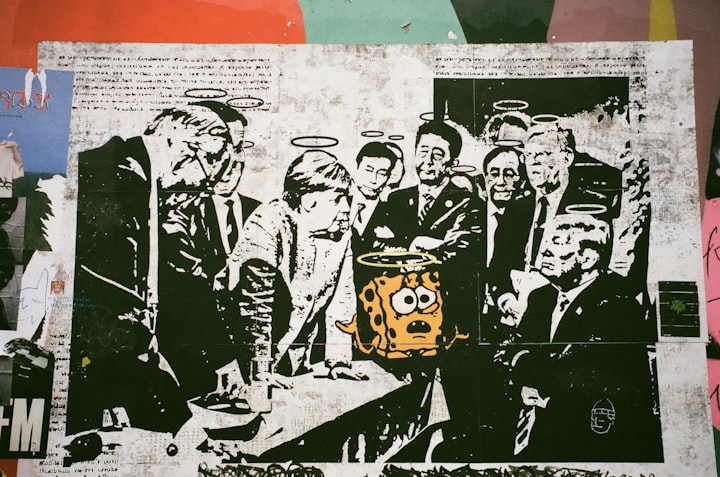15 Mind-Blowing cartoon Fan Theories That Will Change Your Perspective Forever
Rethinking Childhood Cartoons

Rethinking Childhood Cartoons: 15 Mind-Blowing cartoon Fan Theories That Will Change Your Perspective Forever
Get ready to see your favorite childhood cartoons in a whole new light! These 15 mind-blowing fan theories will make you rethink everything you thought you knew about these beloved shows. Dive into a world of mystery, conspiracy, and imagination as we explore these incredible theories that might just change how you view these classic animated series forever.
The Rugrats in Angelica's Imagination:
"Rugrats" is a beloved animated series following a group of toddlers navigating the adventures of childhood. However, one dark fan theory suggests that the entire show is merely a figment of Angelica's imagination. According to this theory, the babies in the show do not actually exist, and Angelica created them as a way to cope with her loneliness and the lack of attention from her parents. Each Rugrat represents a different aspect of Angelica's psyche, and the surreal and sometimes terrifying adventures they embark on can be seen as a reflection of her inner turmoil.
Scooby-Doo's Post-Apocalyptic World:
"Scooby-Doo" follows a group of friends and their talking Great Dane as they solve mysteries involving supposedly supernatural creatures. However, a fascinating fan theory proposes that the show takes place in a post-apocalyptic world where a major economic collapse has occurred. The gang's adventures are their means of survival as they navigate a society where resources are scarce, and people resort to desperate measures to survive.
SpongeBob SquarePants and the Seven Deadly Sins:
"SpongeBob SquarePants" is known for its humor and lighthearted tone, but a thought-provoking fan theory suggests that the main characters represent the seven deadly sins. SpongeBob embodies lust, Patrick sloth, Squidward wrath, Mr. Krabs greed, Plankton envy, Sandy pride, and Gary gluttony. While this interpretation may not have been the creators' original intention, it offers an intriguing perspective on the characters' motivations.
The Flintstones and The Jetsons in the Same Universe:
Two iconic animated series, "The Flintstones" and "The Jetsons," may seem vastly different, one set in prehistoric times and the other in a futuristic utopia. However, a fan theory proposes that they coexist within the same universe. The Flintstones' world exists on the ground, while The Jetsons' futuristic society hovers high above the earth's surface in floating cities.
Ash Ketchum's Coma Theory:
In the "Pokemon" series, a fan theory suggests that Ash Ketchum falls into a coma after being struck by lightning in the early episodes. The subsequent adventures he experiences with his Pokemon are elaborate fantasies created by his subconscious mind as he remains in a comatose state.
The Magic School Bus and Miss Frizzle's True Identity:
"The Magic School Bus" features an eccentric teacher, Miss Frizzle, who takes her students on extraordinary field trips aboard a magical bus. A fan theory suggests that Miss Frizzle is not an ordinary teacher but a powerful timeless being, possibly a Time Lord from "Doctor Who," who uses the bus to educate her students about the wonders of the universe.
Adventure Time's Dark Backstory:
"Adventure Time" is known for its whimsical and colorful style, but a dark fan theory proposes that the world of Ooo is a post-apocalyptic wasteland resulting from a devastating nuclear war known as the Mushroom War.
The Smurfs as a Communist Society:
"The Smurfs" seemingly depicts a harmonious village of small blue creatures. However, a fan theory suggests that the Smurf society is an allegory for a communist utopia, where resources and labor are shared equally among them.
The Dark Side of Winnie the Pooh:
A fan theory suggests that the characters in "Winnie the Pooh" represent different mental disorders or emotional issues. Pooh's obsession with honey, Piglet's timidity, and Eeyore's perpetual gloominess are seen as symptoms of various psychological conditions.
The Fairly Odd Parents and Mental Illness:
In "The Fairly Odd Parents," Timmy Turner is granted magical fairy godparents to help him navigate the challenges of life. A fan theory proposes that the show is actually a depiction of Timmy's struggle with mental illness, with Cosmo and Wanda representing his coping mechanisms.
Inspector Gadget, a Frankenstein Story:
"Insp. Gadget" features a bumbling detective equipped with various gadgets built into his body. A fan theory likens the show to a modern adaptation of the classic Frankenstein story, with Inspector Gadget as a reimagined version of the famous creature.
Foster's Home for Imaginary Friends, a Psychological Perspective:
"Foster's Home for Imaginary Friends" revolves around a magical world where children's imaginary friends come to life. A fan theory suggests that the imaginary friends represent different aspects of the children's personalities and emotions, helping them express and explore their feelings.
Hey Arnold and the Concept of Abandonment:
In "Hey Arnold," the theme of abandonment is evident in the backstory of the protagonist, Arnold, whose parents disappeared when he was a baby. The characters in the show, including Arnold's friends, grapple with feelings of abandonment in various ways, reflecting on the challenges of growing up.
The Powerpuff Girls and Chemical X's True Origins:
"The Powerpuff Girls" features three superhero sisters created in a laboratory accident. A fan theory explores the true origins of Chemical X, the substance that grants them their powers, speculating on its purpose and properties.
Ed, Edd n Eddy, Purgatory's Playground:
A haunting fan theory proposes that "Ed, Edd n Eddy" takes place in purgatory, with the three main characters representing lost souls trapped in an endless cycle of redemption and punishment. The show serves as a poignant exploration of the human desire for connection and the importance of overcoming feelings of abandonment.
These fan theories take classic cartoons and infuse them with new layers of depth and complexity, offering fresh perspectives that forever change how we view these beloved animated series from our childhood. Whether you see them as dark and twisted or thought-provoking allegories, these theories showcase the enduring impact and rich storytelling of these classic cartoons.
Like what you read? Send me a gift below to help contribute to more amazing content like this. Don't forget to subscribe. THANK YOU FOR READING
Like & Share the link to social media
About the Creator
Dennis Thomas IV
"Meet Dennis Thomas IV, the Quirky Innovator 🚀🤓 Armed with a brilliant mind and a penchant for humor, Dennis concocts dazzling solutions that delight. Get ready to explore new frontiers of engagement with Dennis's unique flair!"






Comments
There are no comments for this story
Be the first to respond and start the conversation.